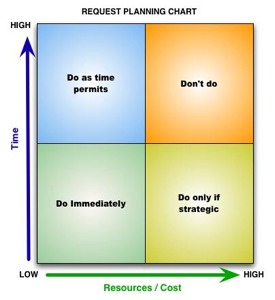
I.T. Departments often have a reputation of not being responsive to the user’s needs.¬ They often are viewed by users as an obstacle to overcome rather then resources to use.¬ While there are many reasons for this, often the problem originates with I.T. Staffs that are frustrated by management directives keeping them reactive rather then proactive.¬ These frustrations can quickly result in responses to users that are short, absolute, and too often negative.¬ Responses such as this often break down communications.
Jason at 37signals did an interesting recent post about using absolutes such as can’t in debates or discussions.
…canÄôt kills priority which is why itÄôs an especially dangerous word.
And thatÄôs the problem with using absolutes in debates. They can be healthy when a decision absolutely needs to be made, but they can also box you into corner by pitting two opposite absolutes against each other. ThatÄôs head-butting, face-saving time. CanÄôt squeezes out middle ground when there is usually middle ground to be reached.
In my previous I.T. position, it was my responsibility to reviewed requirements and requests to determine the benefit, cost, and projected ROI.¬ I always tried to approach this process from the angle that there were no absolutes,,,anything can be done if you were willing to devote enough time, money, and resources.
The first and most critical step in reviewing a user request was always understanding the root requirement driving the request.¬ You can’t begin to think in terms of “how” until you understand the “what”.¬ Often when first looking at an user request my first thought would be, “This is not realistic.”¬ I can’t begin to count the number of times I discovered after meeting with the user that what they were requesting wasn’t what they¬ wanted.¬ Only by sitting down with them and spending some quality discussion time did I get a firm grasp of the problem.¬ You have to understand what it is they are trying to accomplish…what is their final goal.¬ Often after reaching this level of understand I was able to suggest available alternate resources that met their needs, or to get their agreement for a different, more doable, and better solution.¬ The can’t became the can do!¬
In the “real” world time, money, and resources are limited.¬ So there were times when I had to say no.¬ By being open in beginning and exploring all possibilities I could always go back to someone, be it a user or the CEO of the company, and tell them their request CAN’T be completed. I could do this with confidence that there had been an investigative process with clearly defined and documented reasons as to why it wasn’t feasible.¬
I.T. management should be proactive, with strategies to manage change and enable growth, and with clear processes and directives for providing and measuring levels of service to it’s users.¬ It was always to my advantage to avoid unneeded absolutes.¬ After all, with technology advances the requests that were not doable today could well be accomplished tomorrow.
Technorati Tags: communications, requests, users
Discover more from
Subscribe to get the latest posts sent to your email.

